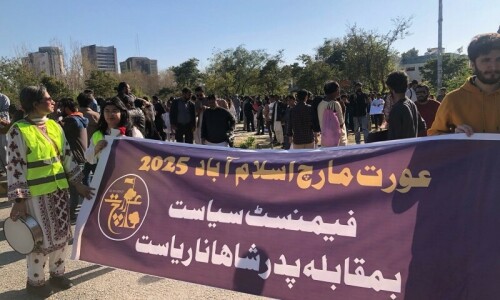ISLAMABAD: The Supreme Court on Thursday reserved its ruling on a set of review petitions instituted by the Punjab government and some mentally sick death row prisoners against execution of convicts suffering from mental illnesses, including schizophrenia.
Before closing the proceedings, however, a five-judge Supreme Court bench headed by Justice Manzoor Ahmad Malik solicited opinion of all the provincial governments and the federal government on whether or not they would support the contention that a convict suffering from mental illness should not be executed.
All the provinces endorsed the point of view and adopted the arguments extended by Dr Mowadat Hussain Rana, a professor of psychiatry, who urged the court to deliver a far-reaching judgement that would provide individuals suffering from mental illnesses a chance to “live differently”.
The special bench was seized with review petitions moved by the Punjab government as well as by Imdad Ali, Kanizan Fatima Bibi and Ghulam Abbas, seeking review of the Oct 19, 2015 judgement of the Supreme Court that held the trial court and the high court had rightly convicted and sentenced the appellants and that the apex court did not find any reason or mitigating circumstances to reduce the severity of their sentences.
Capacity of people suffering from mental disorders may be impaired to such an extent that they cannot handle their problems, court told
Dr Rana argued that prolonged incarceration could lead to mental disorders because the convicts remained separated from their loved ones for long; as a result, their inter-personal skills could get impaired to such an extent that they could not even shop independently in a market.
According to him, schizophrenia is a mental disorder that impairs a person’s ability to think, make judgements, respond emotionally, remember, communicate, interpret reality or behave appropriately to meet ordinary demands of life. The symptoms may include poor reasoning, using disjointed and confusing language, hallucinations, delusions, deterioration of appearance and poor personal hygiene.
Dr Rana emphasised that the capacity of the people suffering from mental disorders was usually impaired to such an extent that they could not handle the problems surrounding them. They should not be set free after prolonged incarceration without proper treatment at some professional psychiatric facility.
“They are like Shah-i-Daula ke choohe and have no idea about their future,” Dr Rana argued and emphasised the need for developing state-of-the-art and forensic psychiatric facilities to which such people could be admitted for treatment.
Technically, it was not mandatory to keep convicts with mental disorders incarcerated, he said, adding that one could find many sick convicts praying at the wrong time and bowing in the wrong direction instead of the holy Kaaba because of their flawed thinking process.
The psychiatry professor said it was the duty of the family, the community, the society, or the state to identify the people with a “grey shade” and then try to help them turn that “shade to white” by admitting them to a proper hospital or facility for treatment.
“We cannot afford to allow such people to go from grey to black and from black to jet black,” he remarked.
During the hearing, Justice Ijaz-ul-Ahsan asked Dr Rana to explain how could one determine the point in time when an individual loses the capacity to understand things but then returns to normal after some time. “Is there any scientific measure to gauge this?”
According to Dr Rana, patients of schizophrenia suffer from the condition of split personality, which is the severest form of mental illness. “In psychiatric terms, it is like a cancer and such a person can become violent, if provoked.”
Dr Rana said that generic, derogatory, outdated, unscientific and misleading terms — like insanity, lunacy, of unsound mind, mentally deranged, disturbed, retarded, manic-depressive, schizophrenic and psychopath — should not just be dropped from books of law but also should not be used in courts as the words were based on folklore, lay information or picked from social media, movies or television dramas.
A sick individual with disturbed higher mental functions of consciousness, thinking, mood, cognition and insight could not be treated on a par with a regular criminal when determining their involvement in criminal activity. “This is because [his/her condition] affects their ability to plead in a court of law or even to completely comprehend the court proceedings and sentencing.”
He emphasised that all this should be factored in by the court while passing a judgement.
Published in Dawn, January 8th, 2021
















































